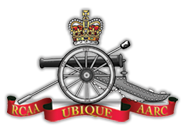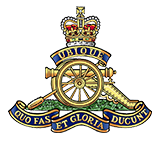Major-General Sir George French CMG (1841-1921)
 Born at Rosscommon, Ireland, in 1841, George Arthur French served for a short period with the Royal Irish Constabulary before entering military service. He attended both Sandhurst and the Woolwich Military Academies and was commissioned in the Royal Artillery in 1860.
Born at Rosscommon, Ireland, in 1841, George Arthur French served for a short period with the Royal Irish Constabulary before entering military service. He attended both Sandhurst and the Woolwich Military Academies and was commissioned in the Royal Artillery in 1860.
On arrival in Canada in 1862, he was employed as Adjutant Royal Artillery at Kingston, a position he held for four years. He was described as, “a fine officer, but on occasion his sound military knowledge and attributes were prone to clash with political and civil phases of Canadian life”. With the departure of the Royal Artillery from Canada in 1871, he was appointed Inspector of Artillery and Warlike Stores (a position he shared with his counterpart in Quebec), as well as Commandant of the School of Gunnery, Kingston and Officer Commanding “A” Battery. His administrative competence, vast experience and attention to detail were soon evident; “A” Battery achieved a remarkable proficiency within one year.
In August 1873 Colonel French accepted the offer to become the founding Commissioner of the North West Mounted Police, an organization already being formed at Lower Fort Garry. He threw himself into the task with his usual determination and enthusiasm. His characteristic disdain of bureaucracy, red tape and established procedure was to permeate the Force – he demanded that decisions be based on the even-handed interpretation of the law, respect for human dignity and above all, common sense.
Driven by the reports of increasing lawlessness in the west, French began the detailed planning for the deployment of his force to Western Canada. He soon realized that a larger force than that initially planned would be required and, that due to the remoteness of the land, they would have to carry all the items necessary to be self-sustaining. With ever an eye for detail he personally supervised the assembly and shipping of the thousands of items that would be needed. Realizing the critical nature of the living element of his force, he took particular care in the selection of both horses and men, accepting only the best.
Facing the formidable task of bringing law to the vast Canadian West would be a monumental undertaking; word that armed outlaw camps had been established which were defended by cannon (taken by force from the United States Army) only gave urgency to the undertaking. As a precaution Commissioner French requested two or three guns for the force; he received two 9-pounders and two mortars.
On 6 June 1874, “D”, “E” and “F” Troops left Toronto on the first leg of their epic journey. Commissioner French led his column from Fargo, North Dakota to Dufferin (65 miles south of Winnipeg) where they joined “A”, “B” and “C” Troops; by the evening of the 19th the force was assembled and ready to depart, much to the dismay of the locals who saw this as a golden business opportunity.
On 8 July, Commissioner French led his column west from Dufferin beginning the Force’s Great March. The men and animals suffered in the heat, wet and cold. Often deprived of food and shelter, they stoically followed Commissioner French ever westward. The trek from Fargo to Dufferin, to the Belly River, Milk River, Fort Pelly and return through Winnipeg to Dufferin was accomplished in 102 days, covering an average of 19-1/5 miles a day!
The aim had been accomplished; a string of North West Mounted Police outposts now crossed the Canadian west. Much to the credit of French and his constables, a friendly and trusting relationship had been established with the prairie tribes. The force had established itself as the law in the Canadian west.
The conclusion of this historic march brought to a head the strained relationship that existed between French and his political masters. He terminated this uncongenial relationship by resigning from the force to return to Imperial Service.
Subsequently, he served in Queensland, Australia, in 1883, India in 1895 and in New South Wales, Australia, in 1899. He was promoted to Major-General in 1900 and was knighted by his Sovereign in 1902; he retired that same year. Major-General French died in England on 7 July 1921.
General French can truly be counted among the builders of Canada. His association with the Royal Canadian Mounted Police and with The Royal Regiment of Canadian Artillery is a source of pride for both organizations.


